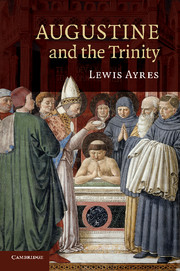Book contents
- Frontmatter
- Contents
- Acknowledgements
- List of abbreviations
- Introduction
- Part I Origins
- Part II Ascent
- 4 The unadorned Trinity
- 5 Per corporalia … ad incorporalia
- 6 A Christological epistemology
- Part III Into the mystery
- Part IV Memory, intellect and will
- Epilogue: Catching all three
- Bibliography
- Scripture index
- General index
- References
5 - Per corporalia … ad incorporalia
Published online by Cambridge University Press: 06 December 2010
- Frontmatter
- Contents
- Acknowledgements
- List of abbreviations
- Introduction
- Part I Origins
- Part II Ascent
- 4 The unadorned Trinity
- 5 Per corporalia … ad incorporalia
- 6 A Christological epistemology
- Part III Into the mystery
- Part IV Memory, intellect and will
- Epilogue: Catching all three
- Bibliography
- Scripture index
- General index
- References
Summary
The previous chapter ended with the transition that occurs in Sermon 52 between Augustine's exposition of the faith that must be believed and his exhortation to the task of understanding that faith. The next two chapters concern the character of this ‘understanding’. In this chapter I begin by arguing that Augustine's early appropriation of a Platonist reading of the Liberal Arts tradition provided the foundations for his account of understanding Trinitarian faith. Between the years 386 and 400, however, we can trace a shift in Augustine's approach to this tradition, but one that should be read as a rejection of that early appropriation only with caution. Many of the intellectual practices that stem from his Platonizing reading of the Liberal Arts tradition remain at the heart of how Augustine conceives the practice of thinking beyond the material and towards the divine. Throughout his mature corpus the search for understanding remains, at its heart, a process of reflecting on the principles of Trinitarian belief, and the scriptural evidence pertaining thereto, attempting to think how these principles and this evidence draw us towards sight of a God who transcends the temporal and material categories with which they are imbued. At the end of this chapter I consider briefly some of the analogical explorations of Trinitarian doctrine found in the Confessiones. In Chapter 6 I turn to the manner in which Augustine adds further theological and Christological density to the task of seeking to understand God in the initial books of the De trinitate.
- Type
- Chapter
- Information
- Augustine and the Trinity , pp. 121 - 141Publisher: Cambridge University PressPrint publication year: 2010



